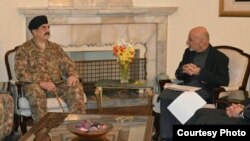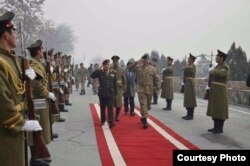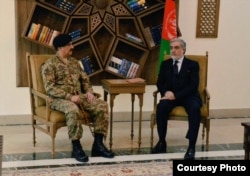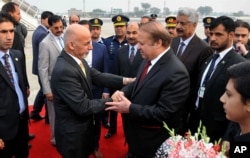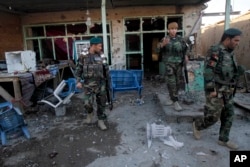Afghanistan and Pakistan have pledged to jointly work for an early resumption of peace talks between Kabul and the Taliban and “sternly” deal with insurgent groups who refuse to quit violence and join the process.
The pledge came Sunday during talks in Kabul between visiting Pakistani military chief, General Raheel Sharif and Afghan leaders.
The general held separate meetings with President Ashraf Ghani and Chief Executive Abdullah Abdullah. Their discussions focused on the way forward for the Afghan peace process, mutual security related issues, sharing of intelligence information and coordinated counterterrorism operations in their respective countries, said Pakistani and Afghan officials.
“Both sides agreed that they would pursue peace and reconciliation with Taliban groups willing to join the process,” a Pakistani military statement said. “Elements who would still continue to pursue violence will be dealt, under a mutually worked out framework.”
'Clear message'
An official later explained to VOA that the meetings sent “a clear message to all Taliban factions waging the Afghan insurgency to “either choose peace or face the consequences.” But he reiterated that it is not for Pakistan alone to further the peace peace process and “all stakeholders have a shared responsibility.”
In talks in Kabul on Sunday, the two sides also agreed to convene next month an inaugural meeting of the recently formed “steering committee” comprising Afghan, Pakistani, Chinese and American officials mandated to oversee and monitor the reconciliation process.
But no date or venue was mentioned, though Pakistani officials have previously said the meeting is likely to take place in the first week of January.
“First round of quadrilateral meeting will be scheduled in January to work out a clear and comprehensive roadmap for a meaningful peace process with a clear demarcation of responsibilities of each stakeholder at all stages,” the army statement announced.
Military to military visits
At Sunday’s meetings Afghan and Pakistani leaders decided to increase frequency of military-to-military visits for better coordination.
General Sharif later met with the U.S. commander of NATO’s Resolute Support mission to discuss the reconciliation process and better coordination for operations along border regions of Afghanistan and Pakistan.
Sunday’s meetings came after Afghan President Ghani’s trip to Islamabad earlier this month for a regional conference of the so-called "Heart of Asia" process, ending a months-long deadlock in bilateral ties over allegations that Pakistan’s military has not cut secret ties to the Afghan Taliban.
Islamabad, using its “limited” influence with the Taliban, brokered and hosted first official direct talks between Afghan and Taliban representatives in early July, also attended by Chinese and American officials.
But a second round was abruptly called off a day before it was revealed that longtime Taliban leader Mullah Omar had been dead for more than two years.
Mullah Omar news scuttles talks
The Afghan government accused Pakistan of covering up the news and orchestrating installation of Omar’s successor, charges Islamabad rejected.
Pakistan, Afghan, Chinese and U.S. officials are also expected to meet in the first week of January to discuss where, when and under what terms the Afghan reconciliation process can be resumed.
The unprecedented rise in Taliban attacks across Afghanistan this year has prompted renewed international calls for urgently seeking a negotiated settlement to the Afghan war to prevent further bloodshed.
The insurgent group has not yet stated whether it is ready to re-engage in peace negotiations.
In a statement this past week, the Taliban condemned alleged direct involvement of NATO forces in recent fighting for the control of the strategically important southern Helmand province where Afghan security forces are said to have lost control of several districts to the insurgency.
The Taliban cited anti-peace forces within the Kabul government, deployment of British military personnel to Helmand and U.S. airstrikes backing Afghan ground troops as steps detrimental to “renewed hopes" for Afghan peace and reconciliation.
